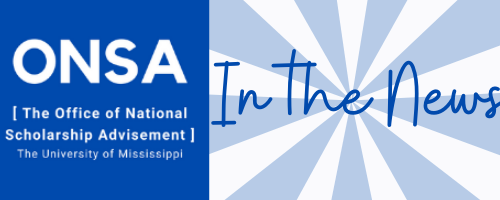What is a National Scholarship or Fellowship?
The scholarships and fellowships advised by ONSA are different than the need-based scholarships and grants that provide tuition support. Broadly speaking, these prestigious awards are funded by external sources such as government agencies or non-profit organizations to support specific missions. Therefore, determining which scholarship to apply for often depends on how closely your own intellectual and professional goals align with the mission of the funding organization. For example, the Goldwater Scholarship is the premier award in the U.S .for high-achieving undergraduate STEM majors who intend to pursue research careers, while the Truman Scholarship supports exceptional undergraduate leaders who intend to pursue careers in government or public service.
National scholarships are competitive awards that reward scholastic achievement and civic engagement.


As the application processes for these awards is typically lengthy and involved, often requiring deep introspection and deep contemplation, the processes themselves are transformative experiences and can springboard a student’s personal and professional goals, regardless of outcome.
Nominations and Campus Deadlines
There are three basic categories for national scholarships and fellowships: Endorsement Required, Endorsement Recommended, and Open.
- Endorsement Required awards have a preliminary application process to obtain an institutional nomination.
- Endorsement Recommended award applications are strengthened by having an institutional nomination, but are not required.
- Open awards are those to which students can directly apply without an institutional endorsement.
On our National Scholarships List, it is clearly indicated which scholarships need and do not need an institutional endorsement.
If an institutional endorsement is necessary, then the applicant will follow a set of campus application procedures before submitting the final application. For these awards, ONSA establishes a campus deadline in advance of the final submission deadline to allow time for application review and committee interviews. The campus deadline will occur weeks or even months prior to the national deadlines posted online, so it is important to take note of both dates. Students must meet the campus deadline to be considered for endorsement. The campus deadlines for the most common awards are listed on the Scholarship Deadlines page.
How to Find YOUR Fellowship
We encourage you to conduct your own searches for fellowships, as the process itself can shape your future goals. We provide several resources to help you with this process!
- Browse our National Scholarships List and find programs that align with your academic, personal, and professional goals. Read through the descriptions carefully and check your eligibility.
- Attend an ONSA information session for an overview of our major scholarships and fellowships and office resources. You can see these upcoming sessions on our Events page!
- Subscribe to our social media pages to see information on upcoming deadlines, new scholarships, and news!
- Instagram: UM_ONSA
- Once you find your fellowship program(s), fill out our ONSA Fellowship Interest Form and schedule an appointment with an ONSA staff member using our Appointment Scheduler.
Preparing for National Scholarship and Fellowship Competition
Unfortunately, there is no simple formula for winning a national scholarship or fellowship; however, whether you end up applying to a national award, graduate school, or a job, there are a few ways to set yourself up for success:
- Grades aren’t everything, but they do help. Maintain the best GPA you can without sacrificing your personal interests and wellbeing!
- Foster relationships with faculty and supervisors – they can be your biggest supporters.
- Be purposeful in your extracurricular activities. Research, clubs, internships, and volunteer activities should align with your interests and/or professional goals. Don’t follow the crowd!
- Seek out real-world experiences and leadership roles – look for ways to make social impact.
- Get your voice heard! Write articles, submit stories, give talks, present at conferences.
- Engage with your local or global community. Learn a foreign language. Pursue opportunities for study abroad. Stay abreast of world events.
- Take a stand – most fellowships seek applicants who are focused on a specific issue or problem. Figure out how you can save the world and get started now!
How to be a Competitive Applicant
Start early. Most national scholarships require a strong academic record, research experience, public service, and leadership.
Academics: Take challenging classes. Develop meaningful relationships with your faculty members since they will be the ones who write your recommendations. Faculty are excellent resources for finding research or service projects and for directing you toward higher level courses or readings. Find out what you are passionate about and immerse yourself fully into that subject. Explore challenging related classes. Academics are always important in national scholarship competitions and so taking challenging classes and maintaining good grades is vital. Most national scholarships are for graduate school so you should be taking a rigorous academic program that will make you a competitive candidate for graduate studies.
Research: Conduct research or work with faculty as a research assistant. Use your summers to conduct research or work as an intern. Offer to be a research assistant to professors that are doing important research in your chosen academic field. Look for community based research projects or paid summer research programs.
Public Service: Get involved in public service. Don’t wait to be told what to do; take charge, create a nonprofit, recognize needs in your community and find ways to address those needs. Look at other national programs for models that might work in your community. Think big. Think sustainable–how will your work continue once you graduate?
Leadership: Student government is one way to be involved in your community. But there are many ways to lead–clubs, organizations, fraternities and sororities, honor societies. How can you be a change-agent and start transforming the communities or issues you care about? How can you rally the support of others in order to make the largest impact possible? Look to other national programs for models and inspiration.
In addition it is important for you to be informed on current events. Read a good periodical newspaper daily. Read current event magazines like The Economist, The Atlantic, The New Yorker, the New Republic or The American Review. Read with a critical eye for bias. Read scholarly journals in your subject area.
Finally, good communication skills are vital. Writing is the key component to every application and many scholarships require an interview if you are named as a finalist. Take advantage of every opportunity to improve your writing and public speaking abilities.
Scholarship Self-Assessment
Here are a few questions you can ask yourself to see how prepared you are to apply for competitive scholarships and/or fellowships. Make sure to begin by thoroughly research any of the awards that interest you. Visit our National Scholarships List and visit the website of individual scholarships. Read the profiles of previous winners, look at sample applications, check out the requirements for eligibility, the criteria for candidates, and the instructions for applying.
-
How is my GPA? Does it fall within an acceptable range for the scholarship?
-
Am I eligible in terms of my citizenship status?
-
What would I do if I received an award? How will the award contribute to my overall career goals?
-
Do I have strong relationships with at least 3 faculty members or other professionals who could write me great recommendation letters?
-
Does my academic and personal experience match the requirements of the scholarship or fellowship?
-
If the scholarship or fellowship requires public service, what service experience do I have?
-
If the scholarship or fellowship requires leadership skills, what leadership experience do I have?
-
If the scholarship or fellowship required previous research experience, what research or lab experience do I have?
-
How would I rate my writing skills? Would it be difficult or easy for me to write personal statements and other needed proposals or grants?
-
Have I already applied to or received any previous scholarships, awards, or prestigious opportunities?

The key to a strong application is…START EARLY! Follow these steps to schedule your appointment!
STEP 1: Look through the Handbook or Website to identify potential awards.
- Each award description in the handbook or website includes eligibility, a description, application procedures, and links to videos/webinars.
- Some awards identify “institutional endorsement required” or “institutional endorsement recommended”. In order to be endorsed by ONSA and the university of Mississippi you must have a complete application by the campus deadline.
STEP 2: Complete the Fellowship Interest Form (required)
STEP 3: Make an appointment with a Fellowship Advisor (strongly recommended)
STEP 4: If you apply for a national fellowship, you will need to complete the Nomination Permission Form and Waiver (required)



